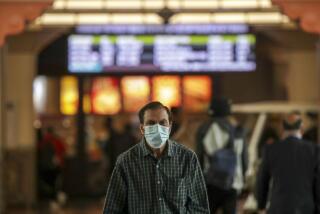Running Yourself Into the Ground? : Health: Hard aerobic workouts can weaken the immune system, researcher contends. He likens such athletes to the elderly and advises them to get flu shots. But his theory has its critics.
- Share via
WASHINGTON — Aerobic athletes who work out very hard may need flu shots because their training can leave their immune systems weakened, a researcher says.
“In my book, they are in the same camp as the elderly and as health care workers, who are at increased risk,” said David Nieman, professor of health and exercise science at Appalachian State University in Boone, N.C.
Nieman’s earlier work has shown that highly trained runners are more likely than more moderate exercisers to succumb to respiratory infections such as a cold or the flu.
Most exercisers, who work out at more moderate levels, don’t face this special need, said Nieman, an expert on the relationship between exercise and infection.
Very hard workouts create an outpouring of the stress hormones cortisol and epinephrine, which trigger one of the body’s first lines of infection defense, natural killer cells, to flood from the spleen into the bloodstream, Nieman said.
Natural killer cells fight viruses by destroying the viruses and the cells that the viruses infect; they also destroy cancer cells in much the same way, Nieman said.
But the cells don’t find an infection to fight when a hard workout mobilizes them, so they then apparently look in other tissue, and don’t return to the spleen for up to six hours, Nieman said.
“We feel viruses can gain a foothold in that period, increasing the risk that an athlete will come down with something later on,” Nieman said.
Nieman and colleagues investigated this by having 10 highly trained runners work at almost a race pace on a treadmill for 45 minutes in one test and walk for 45 minutes in another. Researchers checked the athletes’ blood for numbers of natural killer cells and for levels of the stress hormones.
The study was published in the American College of Sports Medicine’s journal, Medicine and Science in Sports and Exercise.
Cortisol and epinephrine levels were significantly higher when the exercisers ran but not when they walked, the report said.
The higher levels of stress hormones drew a lot of natural killer cells into the blood soon after hard exercise--after which the cells’ levels were down for more than three hours, the report said.
The researchers tested the ability of the natural killer cells to do their job by pitting them against cancer cells in a test tube. Activity on a per-cell basis was higher after hard exercise, but there were fewer cells in blood taken after the hard workout, so the overall effect was a reduction, the study said.
The idea that hard exercise creates a window of opportunity for infection, which Nieman and others support, has its critics.
Other studies indicate that highly trained athletes have higher natural killer cell levels in general, so individual exercise bouts that lower the levels for a while may not make that big a difference, said researcher Laurie Hoffman-Goetz.
Also, natural killer cell activity is only one part of the immune system and should not be overemphasized, said Hoffman-Goetz, a professor in the Department of Health Studies at the University of Waterloo, Ontario.
Hoffman-Goetz believes that the data don’t call for a special warning that hard aerobic exercisers have a special need for a flu shot.
Another expert takes the middle ground. Dr. Leonard H. Calabrese thinks it’s still unclear whether depressed natural killer cell levels can be blamed for these athletes’ greater vulnerability to infection.
It’s also not clear whether influenza, as opposed to a cold, poses a greater risk to these top runners, said Calabrese, head of clinical immunology at the Cleveland Clinic.
Just the same, Calabrese recommends a flu shot. It’s easy to get the shot, and it could be good insurance, he said: “If you miss an event, it could be your season.”






